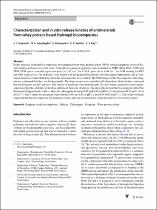 ResearchSpace
ResearchSpace
Characterization and in vitro release kinetics of antimalarials from whey protein-based hydrogel biocomposites
JavaScript is disabled for your browser. Some features of this site may not work without it.
- ResearchSpace
- →
- Research Publications/Outputs
- →
- Journal Articles
- →
- View Item
| dc.contributor.author |
Owonubi, SJ

|
|
| dc.contributor.author |
Aderibigbe, BA

|
|
| dc.contributor.author |
Mukwevho, E

|
|
| dc.contributor.author |
Sadiku, ER

|
|
| dc.contributor.author |
Ray, Suprakas S

|
|
| dc.date.accessioned | 2018-11-06T10:24:52Z | |
| dc.date.available | 2018-11-06T10:24:52Z | |
| dc.date.issued | 2018-03 | |
| dc.identifier.citation | Owonubi, S.J. et al. 2018. Characterization and in vitro release kinetics of antimalarials from whey protein-based hydrogel biocomposites. International Journal of Industrial Chemistry, vol. 9(1): 39-52 | en_US |
| dc.identifier.issn | 2228-5970 | |
| dc.identifier.issn | 2228-5547 | |
| dc.identifier.uri | https://link.springer.com/article/10.1007/s40090-018-0139-2 | |
| dc.identifier.uri | https://doi.org/10.1007/s40090-018-0139-2 | |
| dc.identifier.uri | http://hdl.handle.net/10204/10518 | |
| dc.description | Open access article published in International Journal of Industrial Chemistry, vol. 9(1): 39-52 | en_US |
| dc.description.abstract | In this research, hydrogel biocomposites were prepared from whey protein isolate (WPI), reduced graphene oxide (rGO), and synthetic polymers in varied ratios. Their physicochemical properties were evaluated by FTIR, SEM, TGA, AFM, and TEM. FTIR spectra revealed significant peaks at 1167 cm(sup-1) for C–O–C peak and at 1449 cm(sup-1) for O–H bending for WPI and rGO, respectively. The hydrogels were loaded with proguanil hydrochloride and chloroquine diphosphate and in vitro release kinetics of individual drugs from the biocomposites were studied. The SEM images of the biocomposites after drug release confirmed that they are biodegradable. The drug release was controlled, pH-dependent which further confirmed that the hydrogels are pH-sensitive. The release of proguanil from the hydrogels was slow when compared to chloroquine, suggesting that the solubility of the drug influenced their rate of release. The drug release from the biocomposites fitted the Korsmeyer–Peppas model with n values for chloroquine between 0.46 and 0.49 at pH of 1.2 and between 0.72 and 1.41 at pH of 7.4. The n values for proguanil were between 0.66 and 0.83 at pH 1.2 and 0.85–0.92 at pH 7.4. The results obtained suggested that the biocomposites are potential systems that can be tailored for controlled delivery of bioactive agents. | en_US |
| dc.language.iso | en | en_US |
| dc.publisher | Springer | en_US |
| dc.relation.ispartofseries | Worklist;21494 | |
| dc.subject | Graphene oxide biocomposites | en_US |
| dc.subject | Malaria | en_US |
| dc.subject | Chloroquine | en_US |
| dc.subject | Proguanil | en_US |
| dc.subject | Whey protein isolate | en_US |
| dc.title | Characterization and in vitro release kinetics of antimalarials from whey protein-based hydrogel biocomposites | en_US |
| dc.type | Article | en_US |
| dc.identifier.apacitation | Owonubi, S., Aderibigbe, B., Mukwevho, E., Sadiku, E., & Ray, S. S. (2018). Characterization and in vitro release kinetics of antimalarials from whey protein-based hydrogel biocomposites. http://hdl.handle.net/10204/10518 | en_ZA |
| dc.identifier.chicagocitation | Owonubi, SJ, BA Aderibigbe, E Mukwevho, ER Sadiku, and Suprakas S Ray "Characterization and in vitro release kinetics of antimalarials from whey protein-based hydrogel biocomposites." (2018) http://hdl.handle.net/10204/10518 | en_ZA |
| dc.identifier.vancouvercitation | Owonubi S, Aderibigbe B, Mukwevho E, Sadiku E, Ray SS. Characterization and in vitro release kinetics of antimalarials from whey protein-based hydrogel biocomposites. 2018; http://hdl.handle.net/10204/10518. | en_ZA |
| dc.identifier.ris | TY - Article AU - Owonubi, SJ AU - Aderibigbe, BA AU - Mukwevho, E AU - Sadiku, ER AU - Ray, Suprakas S AB - In this research, hydrogel biocomposites were prepared from whey protein isolate (WPI), reduced graphene oxide (rGO), and synthetic polymers in varied ratios. Their physicochemical properties were evaluated by FTIR, SEM, TGA, AFM, and TEM. FTIR spectra revealed significant peaks at 1167 cm(sup-1) for C–O–C peak and at 1449 cm(sup-1) for O–H bending for WPI and rGO, respectively. The hydrogels were loaded with proguanil hydrochloride and chloroquine diphosphate and in vitro release kinetics of individual drugs from the biocomposites were studied. The SEM images of the biocomposites after drug release confirmed that they are biodegradable. The drug release was controlled, pH-dependent which further confirmed that the hydrogels are pH-sensitive. The release of proguanil from the hydrogels was slow when compared to chloroquine, suggesting that the solubility of the drug influenced their rate of release. The drug release from the biocomposites fitted the Korsmeyer–Peppas model with n values for chloroquine between 0.46 and 0.49 at pH of 1.2 and between 0.72 and 1.41 at pH of 7.4. The n values for proguanil were between 0.66 and 0.83 at pH 1.2 and 0.85–0.92 at pH 7.4. The results obtained suggested that the biocomposites are potential systems that can be tailored for controlled delivery of bioactive agents. DA - 2018-03 DB - ResearchSpace DP - CSIR KW - Graphene oxide biocomposites KW - Malaria KW - Chloroquine KW - Proguanil KW - Whey protein isolate LK - https://researchspace.csir.co.za PY - 2018 SM - 2228-5970 SM - 2228-5547 T1 - Characterization and in vitro release kinetics of antimalarials from whey protein-based hydrogel biocomposites TI - Characterization and in vitro release kinetics of antimalarials from whey protein-based hydrogel biocomposites UR - http://hdl.handle.net/10204/10518 ER - | en_ZA |





